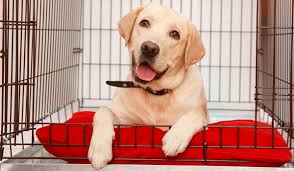We collected advice from Vets, breeders, and pet parents on the top tips they would give new pet owners for week one. Here it is...
1. Use a kennel from day 1. 
Kennels aren't cruel and don't feel like a prison to puppies. It's really the opposite- kennels provide a sense of safety. You may even notice your puppy curling up sometimes in tight spaces. It's their instinct to feel safe in a smaller place. Of course, they don't like to be confined for long periods of time! But overall, kennels are great for puppies and make the training process a lot easier for new pet parents.
Tip: Put a special toy in the kennel with your puppy.
The AKC provides some helpful guidance on crate training new puppies.
2. Schedule a Vet visit as soon as possible..jpg?width=300&name=marina-hanna-ZzEgfT9Fxn4-unsplash%20(2).jpg)
Your Vet can do a health check, provide a vaccination schedule, describe signs of healthy growth and the real warning signs to pay attention to. They can also direct you to local resources like training classes and how to find help if you need someone to watch your pet while you're away. A few priorities for your first visit:
-
- Set-up your puppy's vaccination schedule.
-
Ask about the best time to spay or neuter your puppy.
-
Ask about the signs of illness in the first few months.
-
Ask about the best ways to control internal and external parasites.
- Ask about the best food options for your puppy.
3. A tired puppy is less mischievous.
Puppies have lots of energy and that energy will find an outlet one way or another. The good news is that you can help direct that energy into healthier and less costly outlets like running rather than eating your shoes.
Make sure you give ample time for exercise.
4. Obedience classes are worth the investment.
Permissive parenting will lead to headaches down the road.
Just like with children, our posture with our puppies should be, "high structure and high nurture." Puppies will push every boundary, but they can learn good manners relatively quickly. Maintain positivity with small and frequent treats for good behavior.
The best way to teach obedience is through local classes, which will usually begin around the 6-month mark.
The AKC has good counsel on finding the best obedience training option for your puppy.
One important thing to remember about obedience training:
Your puppy will respond quicker to positive reinforcement rather than consequences for bad behavior. Use small treats frequently to reinforce good behaviors.
5. Peaceful potty training requires prevention, perseverance, positivity and patience
These are the 4 p's of peaceful potty training. For prevention, have a plan that includes a lot of time outdoors at first. The main times to ensure they are going out are: first thing in the morning, right before bedtime, after a nap, after exercise, and after eating or drinking. Pretty much plan on taking them out 20 times a day at first:)
Use a lot of positive reinforcement when they go outside. Don't rub their face in an accident. Accidents will happen at first, but if you're diligent with frequent trips outside and positive reinforcement, they'll learn pretty quick.
6. Find the right food 
There are a lot of puppy food options out there! How should you choose? Talk with your Vet about the best food for your puppy. One thing you can look for is whether the company has undergone AAFCO feeding trials. The best pet food companies invest in research and ensure that their foods have the right balance of nutrients and do not include something that could be harmful. Here is some guidance on decoding a food label:
The two most important pieces of information on a label are the "Nutritional Adequacy Statement" (or "AAFCO statement") and the contact information for the manufacturer.
Look for statements like, "____ is formulated to meet AAFCO nutrient profiles for..."
Pet food manufacturers are required to include an address on labels. However, a phone number, email address, or website are not required. Avoid companies that do not provide contact information for consumers.
My Pet Cab
Subscribe to our Blog
Enjoy our content? Get them sent to your inbox!
Subscribe Now